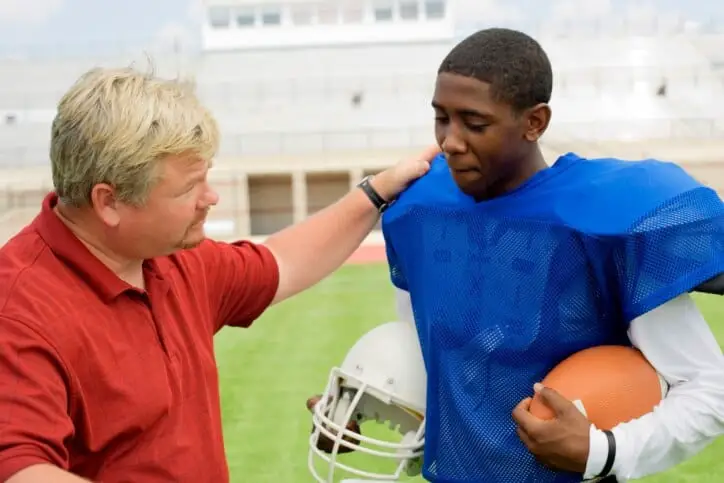Table of Contents

*This post may contain affiliate links. As an Amazon Associate we earn from qualifying purchases.
What Is Motivational Interviewing Training?
Motivational interviewing is a counseling approach that helps motivate a client intrinsically to change a certain behavior that isn’t aligned with their goals or values. It can be used in a variety of fields, such as sports coaching, substance dependence, problem gambling, and brief interventions for behavior change. Motivational interviewing training can even be used in parenting and classroom management.
This counseling approach was developed by Dr. William R Miller and Dr. Stephen Rollnick, Ph.D, two clinical psychologists. Motivational interviewing is effective on athletes because it’s goal-oriented and focuses on the individual. Many athletes have goals they’re trying to achieve, such as making it into the Super Bowl or beating their own records.
The Problematic Sides of Motivational Interviewing Training
Motivational interviewing done incorrectly won’t be as helpful as hoped. For instance, if a sports coach is too direct in their approach or gets into an argument with the athlete while trying to help them change, it will make the athlete more resistant to change. Often, what appears as resistance to change is actually ambivalence, a state of having mixed feelings toward something. An individual may want to change but still have a part of them that doesn’t desire change.
Signs that motivational interviewing isn’t going well are:
- Hostility from the athlete.
- Arguments.
- Defensiveness.
- Inattention.
It’s normal for people to show resistance to change. The key is to alter the approach when that happens instead of continuing to push in the same direction.
6 Tips for Motivational Interviewing Training

1. Adjust to Resistance
Instead of opposing an athlete’s resistance or ambivalence directly, the sports coach should adjust to it. As stated by NCBI, “The goal is to “walk” with clients (i.e., accompany clients through treatment), not “drag” them along (i.e., direct clients’ treatment).” When the individual shows resistance, listen more carefully and change direction. You should also try to avoid saying things that will trigger more resistance.
2. Ask Open-Ended Questions
One can’t answer an open-ended question with a single phrase or in one word. They don’t require a certain response either. Open-ended questions are great for encouraging conversation that helps the sports coach better understand their athlete. Asking open-ended questions also prevents the coach from making premature judgments that trigger resistance in the athlete.
Examples of open-ended questions that sports coaches can ask:
- In what ways are you concerned about your drinking habit?
- What do you think about the possibility of staying calm throughout the game?
- Tell me about your training schedule.
- What do you dream of accomplishing as an athlete?
- What do you think you want to do to accomplish those goals?
3. Use Reflective Listening
Reflective listening is a strategy in motivational interviewing training that involves restating what the athlete said to confirm whether or not the coach understood them. If there was a misunderstanding, the athlete will further elaborate on what they meant. Reflective listening is beneficial because it shows the individual that the coach isn’t making assumptions.
4. Provide Sincere Affirmations
An affirmation is a statement that acknowledges the difficulties the athlete is experiencing and encourages them on the path to success. Affirmations validate an athlete’s feelings and experiences. They also increase the individual’s confidence in themselves and their internal resources to take action and change their behaviors.
Examples of affirming statements that sports coaches can use:
- I appreciate how hard it must have been to let me know. You took a big step.
- It must have been difficult for you.
- It must be difficult for you to accept when another player cheats. I would also find that difficult.
5. Look for Self-Motivational Statements
In motivational interviewing training, it is not the coach’s job to pick change for the athlete. The coach must wait for the athlete to express desire and willingness to change. Self-motivational statements are an indicator that the individual is becoming ready to improve themselves.
Examples of self-motivational statements an athlete may make:
- This is more serious than I realized.
- I know that as long as I don’t give up, I can do this.
- I’m worried about how drinking on the weekends affects my performance.
- I really need to do something about this.
Reinforce an athlete’s self-motivational statements by nodding, reflecting them, making affirmations, and other indicators of approval. A sports coach can encourage the possibility of change when an athlete makes a self-motivational statement by asking for more details, explanations, or further elaboration.
6. Show Empathy
It is important to show empathy for athletes while applying motivational interviewing training. Empathy will help lower their resistance to making necessary changes that improve their performance. It also makes them feel respected, accepted, and understood. Athletes will be more open with their coach if they think that they are truly valued and respected. Come to terms with the fact that ambivalence is normal during motivational interviewing training. It’s important to not become frustrated with an athlete for their ambivalence. Frustration will only interfere with the process.
Final Thoughts
Motivational interviewing is a great counseling approach that sports coaches can use to spark intrinsic motivation in athletes. It is especially helpful if one of the athletes has an obstacle in their away of improving. Some common obstacles include partying too much on the weekends, not eating a healthy enough diet, or having anger problems.
Motivational interviewing can go wrong if the coach pushes for change, argues with, or criticizes the athlete. Whenever the athlete shows resistance, the coach must change their approach to avoid slowing down progress.
If an athlete is suffering from a serious problem like drug dependence, please refer them to a medical professional for help. This article is not a definitive resource.
Have you tried applying motivational interviewing training? Share your experiences in the comments below.
IMAGE SOURCE: 1, 2
